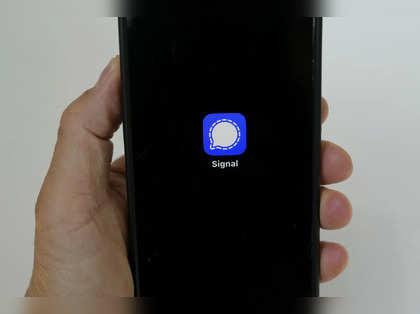Security Breach Exposes Sensitive U.S. Military Plans on Encrypted Messaging App
Table of Contents
- Security Breach Exposes Sensitive U.S. Military Plans on Encrypted Messaging App
- The Signal Chat Incident
- Details of the Leaked Information
- Security Implications and NSA Warnings
- Repercussions and Calls for Accountability
- Broader Concerns and Future Protocols
- How can the U.S. government improve the security of its internal communications to prevent future leaks?
- Frequently Asked Questions (FAQ)
- What is the Signal app, and why is it used by U.S. officials?
- How did the security breach occur?
- What specific information was leaked?
- Did the NSA warn about vulnerabilities in the Signal app?
- What are the potential consequences of this breach?
- What are the broader implications for U.S. military communication protocols?
March 28, 2025
In a significant security lapse, a group chat on the encrypted messaging app Signal, intended for high-level U.S. national security discussions, was inadvertently joined by a journalist from The Atlantic. This incident has raised serious concerns about the security protocols surrounding sensitive military communications.
The Signal Chat Incident
The Signal group chat, labeled “Houthi PC Small Group,” was established to coordinate military operations against Houthi rebels in Yemen. The chat included 18 senior U.S. officials, including Defense Secretary Pete Hegseth, National Security Adviser Mike Waltz, and Director of National Intelligence Tulsi Gabbard. The Atlantic’s editor-in-chief, Jeffrey Goldberg, was mistakenly added to the chat, leading to the unintentional disclosure of sensitive information.
Details of the Leaked Information
According to reports, Defense Secretary Hegseth shared specific details about the planned airstrikes, including the timing of the attacks and the types of weapons to be used. These messages were sent just hours before the operation commenced, potentially compromising the element of surprise and the safety of U.S. personnel involved. The leak has prompted questions about the adequacy of current communication channels for discussing classified military operations.
Security Implications and NSA Warnings
The National Security Agency (NSA) had previously issued a warning about the vulnerabilities of using Signal for sensitive communications. In February 2025, the NSA cautioned that the app, while encrypted, could be susceptible to interception by adversaries, especially if users’ devices were compromised. The agency emphasized the need for secure communication channels when handling classified information.
Repercussions and Calls for Accountability
The incident has led to bipartisan calls for investigations into the breach. Senators Roger Wicker and Jack Reed have requested that the Defense Department’s Office of Inspector General examine the circumstances surrounding the leak. Additionally, a lawsuit has been filed against the involved officials, alleging violations of federal records laws due to the use of a commercial messaging app for official communications.
Broader Concerns and Future Protocols
This event underscores the broader issue of using commercial messaging platforms for official government communications. While apps like Signal offer end-to-end encryption, they may not meet the stringent security requirements necessary for handling classified information. The incident has sparked a reevaluation of communication protocols within the U.S. government, with an emphasis on adopting more secure methods for discussing sensitive operations.
How can the U.S. government improve the security of its internal communications to prevent future leaks?
Frequently Asked Questions (FAQ)
What is the Signal app, and why is it used by U.S. officials?
The Signal app is an encrypted messaging platform known for its strong security features, including end-to-end encryption. U.S. officials have utilized Signal for secure interaction, aiming to protect sensitive information from unauthorized access.
How did the security breach occur?
In March 2025, a Signal group chat intended for high-level U.S. national security discussions was inadvertently joined by Jeffrey Goldberg,editor-in-chief of The Atlantic. This inclusion led to the unintentional disclosure of sensitive military plans regarding operations against Houthi rebels in Yemen.
What specific information was leaked?
Defense Secretary Pete Hegseth shared detailed plans about forthcoming airstrikes, including timing, targets, and weaponry, just hours before the operation commenced. this premature disclosure raised concerns about operational security and the safety of U.S. personnel involved.
Did the NSA warn about vulnerabilities in the Signal app?
Yes, in February 2025, the National Security Agency (NSA) issued a warning highlighting vulnerabilities in the Signal app. The NSA cautioned that while Signal offers end-to-end encryption, it could be susceptible to interception by adversaries, especially if users’ devices were compromised. the agency emphasized the need for secure communication channels when handling classified information.
What are the potential consequences of this breach?
The incident has led to bipartisan calls for investigations into the breach. Senators Roger Wicker and Jack Reed have requested that the Defense department’s office of Inspector General examine the circumstances surrounding the leak.Additionally,a lawsuit has been filed against the involved officials,alleging violations of federal records laws due to the use of a commercial messaging app for official communications.
What are the broader implications for U.S. military communication protocols?
This event underscores the broader issue of using commercial messaging platforms for official government communications. While apps like Signal offer end-to-end encryption, they may not meet the stringent security requirements necessary for handling classified information. The incident has sparked a reevaluation of communication protocols within the U.S. government, with an emphasis on adopting more secure methods for discussing sensitive operations.

